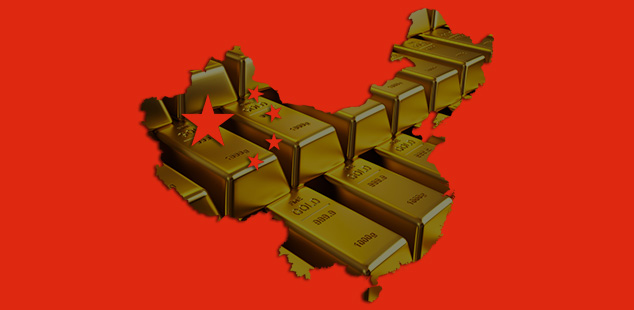
China’s financial institutions are just reopening after a traditional week off for celebrating the New Year. However, Chinese officials have been watching the global markets closely during this period, and observers are anxious to see what actions are taken in the coming week and beyond. Recently, Chinese economic indicators have been ravaging the world marketplace, so the state of the Chinese economy is significant to many different markets, including gold. In addition to the demand created by struggling financial markets, China also affects the gold market because the country is one of the largest buyers of gold in the world.
China’s Economy Sends Ripples Through World Markets
China’s central bank is estimated to still hold more than $3.2 trillion in reserves, the largest of any nation.[1] However, recent activity has depreciated the value of the yuan and subtracted an estimated $420 billion in value over just the last six months. The People’s Bank of China (PBOC) sold nearly $100 billion in dollars in January alone to prop up the national currency. (See below for how this has affected gold buying.)
However, the intricacies of the Chinese financial picture and its government policies make it opaque on many critical factors. The Chinese economy affects virtually every aspect of the global financial structure, making the value of the yuan only one area of concern. Speculation over the slowing growth of the Chinese economy (showing the slowest economic growth in 25 years in 2015) has most governments and analysts parsing every element of news and decisions coming out of the country.[2]
There is also a bit of irony as some report the lower growth last year as essentially on target (6.9 percent versus a projected 7 percent) and view the news as something of a positive indicator. Many others interpret the slowdown as a harbinger of more bad news and are concerned that the Chinese economy will reach a not-too-gentle landing in 2016.
China Continues to Stockpile Gold in Reserves
Despite the difficulty in determining many details about the Chinese economy and activities, one thing is clearly documented. Those who invest in gold note that the Chinese, along with the Russians, are on a full-fledged buying spree when it comes to gold.
The numbers reported show that these countries bought more than 43 tons (China 21, Russia 22) of the precious metal in November of 2015, nearly double that of October purchases. Moreover, China added another 19 tons in December and has continued to buy gold in 2016. (This underlies the fact that gold imports to China have grown more than 700 percent since 2010.)[3]
Other traders point out, however, that even with these new additions the holdings in gold represent only 1.7 percent of the total PBOC reserves. This indicates substantial room for continued purchases as the bank moves to shore its reserve totals.
A Three-Tiered Global Bellwether
Analysts and economists are now monitoring the three key markets of Europe, China and the U.S. to get a better direction on economic expectations for 2016. They also note the fact that European markets are especially tied to the direction of China’s overall economic health.
Pain Points for China’s Economy
A special analysis by Bloomberg identifies several key “pain points” for China in the coming months. These include:[4]
- Significant (even catastrophic) overcapacity in real estate and property markets
- Many large ill-placed investments
- Inefficient and non-productive state-owned corporations and businesses
- Rising bad debt and illiquid banks and local governments
- Underfunded pension and health plans
While there are a number of other factors, the Bloomberg report summarizes that the “control” element of China’s state-controlled government is losing its meaning. These harsh realities give credence to the questions some have about why China is buying gold in such great quantities. The country now consumes 40 percent of all newly mined gold, and the increase in central bank reserves does not explain where the gold is going.
What Is China Doing With So Much Gold?
John LaForge, head of Wells Fargo’s commodities team, states, “Next to oil, gold is probably the most important commodity in the world. The Chinese don’t want you to know what they’re doing with gold, and China has a lot more gold than they declare.” While it remains to be seen what happens with China’s gold, the laws of supply and demand dictate that the less gold there is on the market (lower supply), the higher prices will be (higher demand).
Additional Sources:
[1] http://www.bbc.com/news/business-35573266
[2] http://www.bbc.com/news/business-35349576
[3] http://www.mining.com/china-russia-lead-central-banks-gold-buying-spree/
[4] http://www.bloombergview.com/quicktake/china-economy-reform

